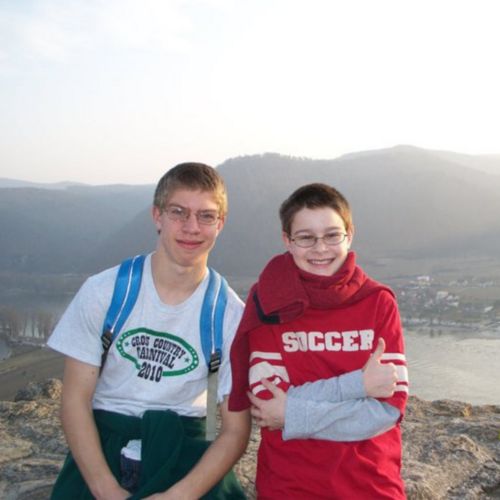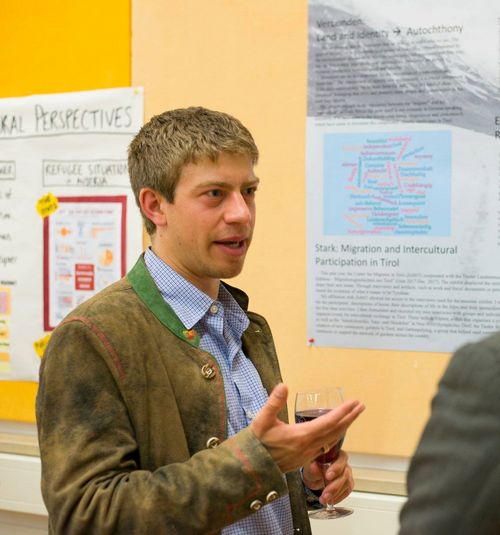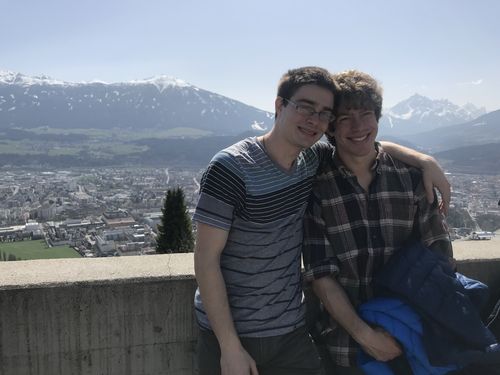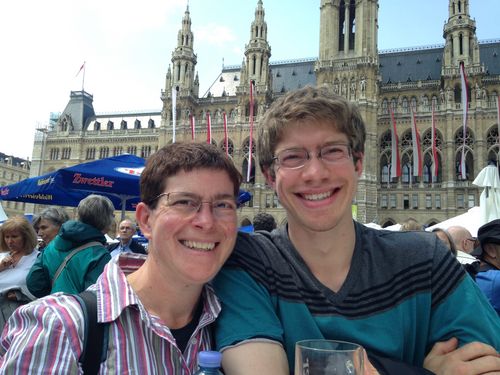To borrow from Falco’s well-known hit song, we heard Austria calling—and we did our best to answer! In the last four years, three Hellenbrands have participated in Fulbright Austria programs. After receiving his BA from Appalachian State University in Boone, North Carolina, Ryan was a community-based combined grantee in 2017–18 with the Zentrum für MigrantInnen in Tirol (ZeMiT). In spring 2020, Alexandra came to Graz as the Fulbright visiting professor of cultural studies at the University of Graz, and Matthew was a 2020–21 US teaching assistant in Carinthia (Feldkirchen in Kärnten) after his graduation from the University of North Carolina at Greensboro. Matthew also decided to pursue an MA in game studies and engineering at the University of Klagenfurt.
A family full of Fulbright
6 July 2021Within our community, three of our alums are connected not just through Fulbright Austria, but also by blood. What inspired three members of the Hellenbrand family to come to Austria? Find out in this article!
Why Austria?
Matthew probably says it best. Not only does Austria have “mountains, mountains, and more mountains.” It is also German (i.e., German language and German-speaking culture), but it is different from Germany. But we might say it all began with German and with Christmas cards. Each one of us studied German in school; Matthew and Ryan would say their parents (who are both German teachers) made them do it. There may be some truth to that, though it happened with the best of intentions. Like many US families, particularly with roots in the Midwest, our family emigrated in the 1800s from German-speaking areas. Alexandra’s family came from the Rhineland to settle in New York; she started to learn German in school and liked it so much she made a career out of it as a professor of German. The Christmas cards that came from Europe every year to Alexandra’s family did not come from Germany, though: they came from Vienna. They were sent by a granddaughter of that Rhineland family who had grown up in Munich and had then married a young entrepreneur from Vienna. In 1987, Alexandra was able to visit this family in Vienna for the first time and to meet the distant relatives she had only known from those yearly holiday photos. She has continued to find ways to return ever since. She has also been fortunate to be able to combine her personal and professional interests. As an undergraduate, she had taken an interdisciplinary course on music and literature in Vienna. She carried the memory of that course with her until she could eventually create one like it in 2008, when she brought 20 students and two colleagues to Vienna—and brought Ryan and Matthew along as well.
Going to Vienna as 13- and 6-year-old “tag-alongs” for their mom’s class in 2008 was the first time Ryan and Matthew ever remember going to Austria. Vienna was amazing: all of the museums (so many museums!), the cafés, and the chance to explore its long, rich history—along with a number of other cool places too, like the Hayden house in Eisenach and the Riesenrad at the Prater. Ryan remembers 2011 even more than that trip, though. This was another tag-along trip, this time while we were on sabbatical teaching in Karlsruhe. While we were there, we took an amazing summer trip to Brixen and Roddenegg in Südtirol (we know—it is not technically Austria). It was like our home in Boone but better! Bigger mountains to hike up, more snow to ski on in the winter, and more German language everywhere. Those mountains made such an impression on Ryan that he integrated them into the personal statement for his eventual Fulbright application. And Matthew would concur about the appeal of “mountains everywhere.” Ryan might have started the family Fulbright trend. On the other hand, while Matthew studied at the Uni Konstanz for a semester, he visited Ryan and fell in love with the mountains around Innsbruck and knew that he wanted to find a way back there. And Alexandra had long harbored a plan to apply to Austria eventually because Austria offers a unique intersection of personal fascination, family history, and professional interests. Austria keeps calling us, it seems: the mountains (where Ryan did trail running in 2018), the people, the trains, the music, the food (Matthew is the consummate fan of schnitzel), the trivia (Alexandra has told countless high-school students at Open House events about Tootsie roll candies as an Austrian-American invention).
 Ryan, Alexandra, and Matthew in Vienna in 2011
Ryan, Alexandra, and Matthew in Vienna in 2011 Ryan and Matthew in Dürnstein in 2011
Ryan and Matthew in Dürnstein in 2011Our programs
We might belong to the same family, but of course we are different people. We were fortunate that Fulbright Austria has a variety of programs that suited our individual needs.
Matthew is currently in the US Teaching Assistantship program, and he really enjoys engaging with students exclusively. He gets to connect to the other teachers and the community through that role. Talking with the students and connecting with them through their language classes has been a really enriching and enjoyable experience. Matthew has enjoyed developing and sharing lessons on US culture; he loves how his Austrian students offer him unique perspectives on his home culture. As he looks at his Austrian students, who are between the ages of 12 and 18, he realizes that they are what the future looks like—their perspectives matter. By interacting with the next generation of Austrians, one can be a part of what comes next. And, of course, one cannot underestimate the effect of COVID as a major factor in shaping his USTA experience.
As part of his Community-Based Combined Grant, Ryan got to teach in Gymnasien while also working part time with a community organization and taking classes at the Uni Innsbruck (in the Geography Department). While initially surprised by how much time the teaching took up relative to the other parts of the program, he enjoyed teaching and getting to know colleagues there better. Ryan even got to participate in some professional development with them when The Olga Lengyel Institute for Holocaust Studies and Human Rights held a seminar for US and Austrian teachers at the Bundesrealgymnasium in der Au, where he was teaching. Similarly, the partnership with ZeMiT offered numerous opportunities to develop professional and research skills by working in the Dokumentationsarchiv Migration (DAM) and attending conferences and seminars on regional workforce development and migration issues.
 Ryan at the 2018 Fulbright Seminar in American Studies in Strobl
Ryan at the 2018 Fulbright Seminar in American Studies in StroblAlexandra was thrilled to be the 2019–20 Fulbright-Karl Franzens University Graz Visiting Professor of Cultural Studies in Graz. She was delighted to affiliate with the institutes of history, American studies, and German studies as well as the Center for Inter-American Studies. Alexandra will always say she was excited to apply for a “grown-up” Fulbright grant, as she is also an alum of the student program in Germany. It is, however, also worth repeating that the advantage for her of Fulbright Austria’s programs is the combination of research and teaching for faculty. The opportunity to do research in Austria with Austrian colleagues was important, but she has also spent her academic career as a scholar-teacher whose research informs her teaching and vice versa. In addition, she not only wanted to live in Austria; she also wanted to get to know an Austrian university from the perspective of a faculty member.
Ryan and Matthew: USTA vs Combined Grant
Ryan was in Germany during the 2015–16 academic year, when there was a large influx of refugees to Europe. He offered his skills to a language teaching program. Getting settled in a new place is so much about learning the lay of the land, literally and figuratively, so these issues at the intersection of place, identity, and belonging were growing in intensity. Having spent so much time in Germany, Ryan started looking at Austria and he found the Community-Based Combined Grant, which fit his interests even better than a straight research grant. Ryan was interested in the prospect of working on a project in tandem with a community organization and also teaching. So while he was studying abroad in Freiburg, he did a bit of searching and found the project “Erinnerungskultur” that ZeMiT was doing in Innsbruck—so the opportunity to ask these questions about identity and history, with his own addition of environment as context, in tandem with an organization doing good public-history work in the community was the biggest draw. And then he was able to combine that with teaching, which he does enjoy and wants to continue.
 Matthew and Ryan in Innsbruck in 2018
Matthew and Ryan in Innsbruck in 2018So Fulbright and Austria were part of the conversation two years later when younger brother Matthew was approaching college graduation. During the fall semester of his senior year, he did not really consider the study/research program, partly because his plans were still pretty fluid and he was adjusting to a new role as a resident assistant at his university. But he was developing an affinity for teaching and outreach. And he was trying, very practically, to figure out how to turn his interests in German along with his major in global studies and his desire to pursue human rights into a productive post-graduation activity. And then, well, there were those mountains he wanted to see again. Plus an application deadline in January for the USTA program. That was really helpful, because in the fall semester he was still trying to figure out his options. He was interested in teaching as well as pursuing a master’s degree, which he is doing now at the University of Klagenfurt. In addition, he is really thrilled that he could be renewed as a USTA for the 2021–22 program year.
The impact of COVID-19
Both Matthew and Alexandra were in Austria during and affected by the COVID-19 pandemic, though at different points in the pandemic. Alexandra was in Austria from 18 February 18 to 1 April 2020, and it is safe to say that the experience solidified her desire to return; as a result of her experience, she has tremendous admiration for the way in which Austrians confronted the pandemic. From her vantage point in Austria, she was fortunate to be safe and isolated... and, as a student of language and culture, she watched a cultural experiment unfold. From the repeated public-service announcements by the federal government that flooded the airwaves to the almost immediate university and business closures and the empty streets—and the French hornist who practiced in the nearby park—the generally disciplined and uniform response to the accelerating crisis was amazing to behold. It was a stark contrast to the situation in the US at the time. She remembers one broadcast of a sundown performance across Austria of Rainer Fendrich´s song “I am from Austria” that had been organized to show solidarity with first responders. Being there at that time made her feel that she shared just a tiny bit in that solidarity, even as she was preparing to return to the US. She has, however, endeavored to build upon and deepen the connections she made during her short time in Graz; in this, technology has offered great opportunities. Someday, she looks forward to continuing her virtual conversations in person!
Matthew arrived in Feldkirchen in Kärnten to take on the responsibilities of a USTA in October 2020, right in the middle of the COVID-19 pandemic. From the beginning, he appreciated all of the precautions that the government took to protect its citizens and residents, including himself. The pandemic was, however, very challenging for his own emotional state-of-mind. It was hard to be in Austria and away from home, even if his parents kept telling him they were sure he was safer in Austria than in Boone. On the other hand, the students and the teachers at the schools where he was teaching were really supportive. And it was this experience that strengthened his resolve to renew the teaching assistantship for a second year—he wants to be able to explore and appreciate Austria more than he has been able to during the pandemic. Matthew is grateful to have the chance to give back more fully because the people he has met at school and in his village have taken really good care of him. And he knows that he has learned more about creativity and resilience than he ever thought possible.
 Matthew and Alexandra in Graz in February 2020
Matthew and Alexandra in Graz in February 2020 Alexandra and Ryan at the Rathaus in Vienna in 2016
Alexandra and Ryan at the Rathaus in Vienna in 2016Our experiences have certainly each been unique as we have traveled different paths in different parts of Austria. But we think it is really pretty cool that we can all share a personal and a professional relationship with this fascinating and beautiful spot on the world map. All of us have agreed we will continue to find ways to return, to give back, to explore our connections further and continue the personal and professional conversations that Fulbright Austria has helped us start.